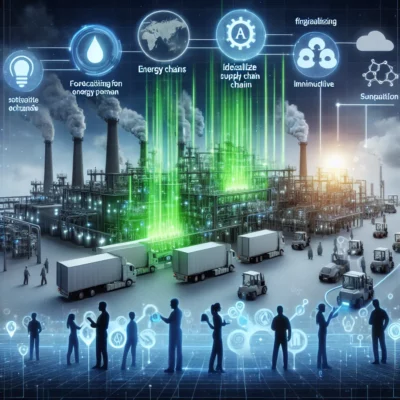In the era of rapid technological advancement, Artificial Intelligence (AI) has emerged as a pivotal force in transforming industries towards more sustainable and efficient practices. As global concerns over energy consumption and environmental impact continue to rise, industries are increasingly turning to AI to spearhead a green revolution. This blog delves into the multifaceted role of AI in enhancing energy efficiency, driving sustainable innovations, overcoming adoption challenges, and paving the way for a more sustainable industrial future.
Understanding AI’s Role in Energy Efficiency
AI is revolutionizing how industries approach energy consumption by offering sophisticated tools to analyze and optimize energy usage. Here’s how:
- Analyzing Energy Consumption Patterns: AI systems can process vast amounts of data to identify inefficiencies in energy consumption. By analyzing patterns, AI can pinpoint areas where energy is wasted and suggest corrective measures, leading to significant reductions in energy usage and costs.
- Predicting Energy Demand: One of AI’s remarkable capabilities is its ability to predict energy demand accurately. By analyzing historical data and real-time inputs, AI can forecast future energy needs, allowing industries to optimize their energy supply accordingly. This not only ensures that energy is used efficiently but also reduces the reliance on non-renewable energy sources.
- AI-Driven Energy Management Systems: Many industries have adopted AI-driven energy management systems to streamline their operations. For instance, AI can automate the control of lighting, heating, and cooling systems in factories, adjusting them in real-time based on occupancy and usage patterns. This leads to substantial energy savings and a reduced carbon footprint.
AI-Driven Innovations for Sustainable Practices
Beyond energy efficiency, AI is driving innovations that promote sustainable industrial practices:
- Predictive Maintenance: AI technologies enable predictive maintenance by analyzing equipment data to predict failures before they occur. This proactive approach reduces downtime and prevents energy waste associated with malfunctioning machinery. By maintaining equipment in optimal condition, industries can significantly lower their energy consumption.
- Optimizing Supply Chains: AI plays a crucial role in optimizing supply chains, which are often a major source of carbon emissions. By analyzing data across the supply chain, AI can identify inefficiencies and suggest improvements, such as optimizing transportation routes or reducing excess inventory. This not only minimizes the carbon footprint but also enhances overall operational efficiency.
- Case Studies of Success: Industries across the globe are reaping the benefits of AI-driven sustainability initiatives. For example, a leading automotive manufacturer implemented AI to optimize its production processes, resulting in a 20% reduction in energy use. Similarly, a major food processing company used AI to streamline its supply chain, cutting emissions by 15%.
Overcoming Challenges in AI Adoption
Despite its potential, industries face several challenges when integrating AI for energy efficiency:
- Common Barriers: The most common barriers include high initial costs, lack of technical expertise, and resistance to change. Many industries struggle to justify the upfront investment in AI technologies, especially when the return on investment is not immediately apparent.
- Strategies for Overcoming Challenges: To overcome these challenges, industries can adopt a phased approach to AI implementation, starting with pilot projects to demonstrate value. Additionally, forming partnerships with AI specialists can provide the necessary expertise and support.
- Stakeholder Engagement and Training: Successful AI adoption requires the engagement of all stakeholders, from top management to operational staff. Providing comprehensive training and fostering a culture of innovation can ease the transition and ensure that AI tools are used effectively.
Future Prospects: AI and Sustainable Industry
As AI technologies continue to evolve, the prospects for sustainable industrial practices are promising:
- Emerging AI Technologies: Emerging AI technologies, such as machine learning and the Internet of Things (IoT), promise further improvements in energy efficiency. These technologies can provide more accurate predictions and real-time optimizations, leading to even greater energy savings.
- Transforming Industries: Over the next decade, AI is expected to transform industries by enabling more sustainable practices. From smart factories that autonomously adjust operations for maximum efficiency to AI-driven circular economies that minimize waste, the potential is vast.
- Investing in AI Research and Development: For industries to fully realize the benefits of AI, investing in research and development is crucial. By dedicating resources to AI innovation, industries can achieve long-term sustainability goals and gain a competitive edge in an increasingly eco-conscious market.
AI is not just a tool for improving efficiency; it is a catalyst for a broader transformation towards sustainability. As industries embrace AI, they have the opportunity to lead the charge in the green revolution, setting a precedent for future generations. The journey towards a sustainable future is not without its challenges, but with AI as a partner, it is a journey worth taking.
